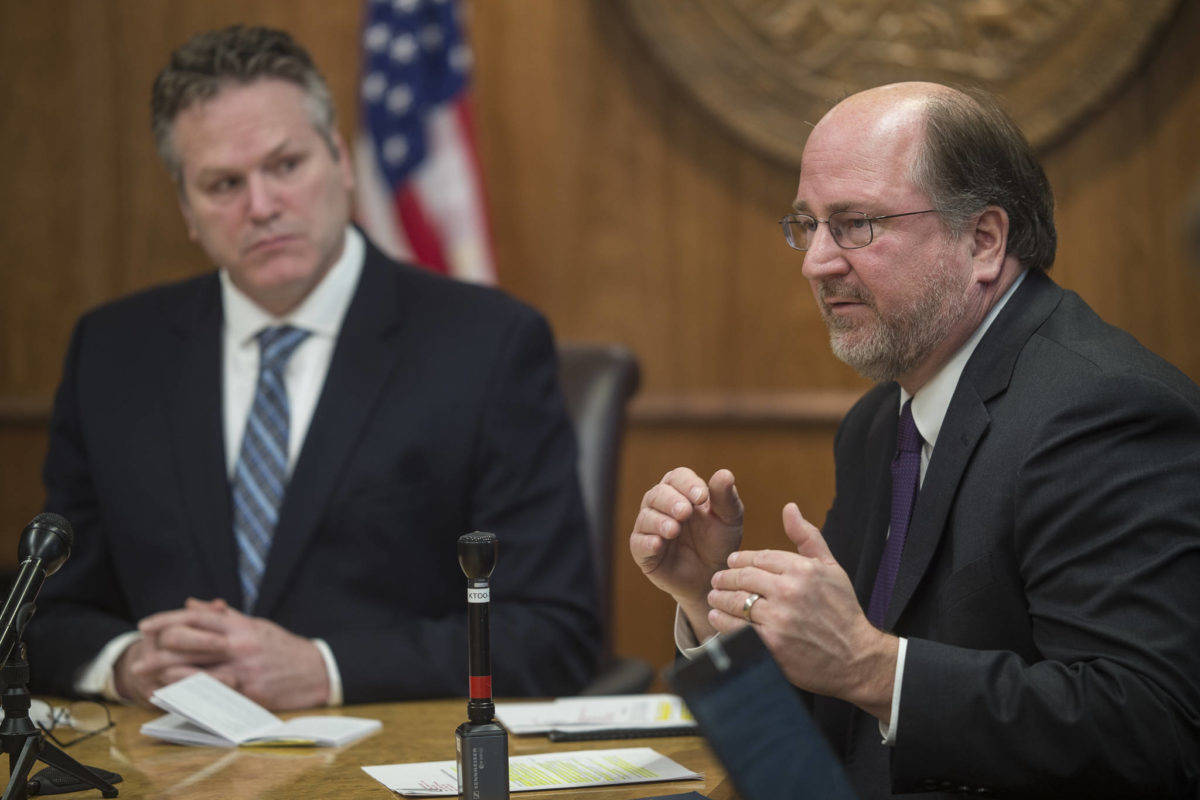An Anchorage superior court ordered the state of Alaska to pay $186,000 Monday in damages to the state’s largest public employee union.
The order issued Monday stems from a lawsuit over a 2019 administrative order from Gov. Mike Dunleavy regarding the payment of union dues.
Administration Order 312, issued by Dunleavy in September 2019, ordered the Alaska Association of State Employees to stop collecting union dues from workers’ pay-checks unless those workers regularly opt-in with consent agreements submitted to a website managed by the state. Under the current system, the one ultimately upheld by the court, the union manages an opt-out system in which employees who don’t want dues deducted from their checks must file a request with the union.
The issue stems from an Aug. 27, 2019, legal opinion from then-Attorney General Kevin Clarkson that said the state was not in compliance with the 2018 Janus v. American Federation of State, County, and Municipal Employees Council 31 decision. In that case, the U.S. Supreme Court said that because unions engage in political activity such as lobbying, paycheck deductions from non-union employees represented by union contracts constituted a violation of free speech.
[‘We’re going to fight them all the way’: Alaska union plans to fight legal ruling over dues]
However, the Janus case applies specifically to non-union members represented by a union-negotiated contract, and to union fees, instead of dues paid by active members of a union, as the governor’s administrative order would have done.
The state had already been found to be in compliance with Janus under Gov. Bill Walker, according to Jake Metcalfe, executive director of ASEA. Metcalfe maintained throughout the duration of the case the Walker opinion was legally sound, and the Dunleavy administration’s attempt was a politically motivated attack on unions.
“If they want to do this, I guess they will, but we’re going to fight them all the way,” Metcalfe told the Empire the day the opinion administrative order was issued.
Metcalfe and other union representatives in the state have accused the governor of attacking workers’ rights and trying to get the case taken to the U.S. Supreme Court. In September 2019, the Dunleavy administration hired Arlington, Virginia-based Cosovoy McCarthy PLLC, to manage the case. That firm was also retained by former President Donald Trump in his attempt to shield his tax returns from the state of New York. The Alaska State Legislature ultimately voted against appropriating funds to hire the firm during last year’s session.
Superior Court Judge Gregory Miller ruled against the state, writing, “the August 27, 2019 legal opinion is incorrect and that Administrative Order 312 is invalid and has no legal effect.”
Miller ruled that with the administrative order the Dunleavy administration breached the collective bargaining agreement between the union and the state, violated the separation of powers enshrined in the state constitution and violated federal labor law. In addition to the payment for damages, Miller granted ASEA an injunction preventing the state from unilaterally changing union dues deduction practices in the future.
A court order in October 2019 halted any changes the state tried to make to dues collection
In a statement, Metcalfe said he was pleased with the decision.
“The Governor took a radical and unsupported legal action that hurt all state employees. This has wasted state resources, time, and attention from other more important issues like governing,” Metcalfe said. “The Court agreed with us and held that the Clarkson opinion and the Governor’s order and illegal Administration policies it propped up are not supported in law.”
In an email Dunleavy spokesperson Jeff Turner directed questions to the Department of Law.
Assistant Attorney General Maria Bahr said in an email the state will look at next steps such as an appeal once the court has filed a final judgment.
According to the Bureau of Labor Statistics, roughly 20% of Alaska’s employees were represented by a union in 2020, while only about 18% are actual union members. Union representation in Alaska rose slightly from 2019 to 2020, according to BLS statistics.
• Contact reporter Peter Segall at psegall@juneauempire.com. Follow him on Twitter at @SegallJnuEmpire.

